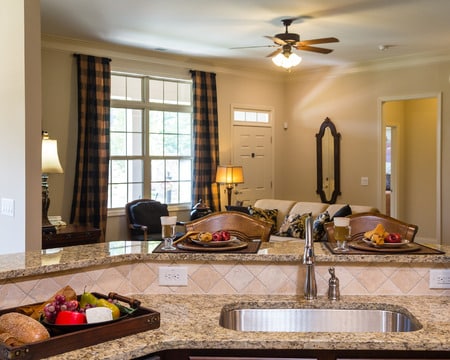
Replacing your kitchen countertops can be a transformative decision, changing not only the look and feel of your kitchen but also impacting its functionality. As one of the most heavily used surfaces in any home, countertops endure daily wear and tear, from food prep and spills to hot pots and more. Here, we’ll look at when it might be time to replace your countertops, how to choose the right materials and some key considerations for planning this significant home update.
Signs It Might Be Time to Replace Your Countertops
Sometimes, the decision to replace countertops is based on aesthetics, while other times, it’s due to functionality or durability issues. Here are a few indicators that suggest it might be time for new countertops:
1. Visible Damage
- Cracks and Chips: These often indicate that the material has weakened over time. Chips can also be hazardous, especially in homes with children, as they can have sharp edges.
- Stains and Discoloration: Stains are common on lighter-colored countertops or materials that are porous, like marble and concrete. If repeated sealing and deep cleaning aren’t helping, it may be time to consider replacement.
- Burn Marks: For materials that are not highly heat-resistant, placing hot pans or dishes directly on the surface can leave marks that become permanent.
2. Outdated Style
- If your countertops are still rocking a design trend from the 1980s or 1990s, they may be due for an upgrade. Modern countertop materials offer more variety in colors and patterns, from the classic look of marble to bold, unique quartz designs. An update can quickly bring your kitchen into the current era.
3. Difficulty Cleaning or Maintaining
- Countertops that are porous or have developed micro-cracks over time can be difficult to keep clean. If you’re spending too much time scrubbing or resealing, it might be time to choose a lower-maintenance material.
4. Frequent Repairs Needed
- Some countertops can be repaired when damage is minor, but constant repairs add up. If you’re repeatedly patching up your countertops, replacing them may be a more cost-effective choice.
Choosing the Right Countertop Material for Your Kitchen
The material you choose will largely depend on your lifestyle, kitchen use, and maintenance preferences. Here are a few popular options and what makes each unique:
1. Quartz
- Durability: Quartz is incredibly durable, as it’s engineered from natural quartz stone mixed with resins. It’s highly resistant to scratches, stains, and heat.
- Maintenance: Quartz is non-porous, meaning it doesn’t need to be sealed and is easy to clean. It’s great for families who want low maintenance.
- Appearance: Quartz offers a huge range of colors and patterns, mimicking natural stone without the need for regular upkeep.
2. Granite
- Durability: Known for its natural hardness, granite is heat-resistant and can handle wear and tear with ease.
- Maintenance: Granite does require periodic sealing to protect against stains, but with proper care, it can last decades.
- Appearance: Each slab of granite is unique, making it a great choice for homeowners who want a one-of-a-kind kitchen.
3. Marble
- Durability: Marble is softer than granite and quartz, making it more prone to scratches and stains. However, it’s highly heat-resistant.
- Maintenance: Marble requires more maintenance than granite or quartz, including frequent sealing to prevent staining.
- Appearance: Marble’s timeless look and classic veining are popular for luxurious kitchens, though it may require extra care.
4. Soapstone
- Durability: Soapstone is very durable and highly resistant to heat and stains, although it’s softer than granite or quartz and can scratch more easily.
- Maintenance: It’s non-porous, so it doesn’t need sealing, but it does require oiling to maintain its color.
- Appearance: Soapstone has a natural, soft look with light veining, adding a unique touch to rustic and modern kitchens alike.
5. Laminate
- Durability: Laminate is less durable than natural stone options but is resistant to stains.
- Maintenance: It’s one of the most low-maintenance materials, as it’s non-porous and easy to clean.
- Appearance: With advancements in design, laminate can mimic other materials quite effectively and is available at a budget-friendly price.
Planning Your Countertop Replacement
After choosing a material, planning is crucial to make sure your project runs smoothly. Here are some steps to guide you through the process:
1. Take Accurate Measurements
- Measure each section of your countertop area, including any islands or peninsulas. Knowing the exact dimensions will help you estimate material costs more accurately.
- It’s often helpful to sketch out the layout to provide your installer with clear visuals of the space. Most professionals can help confirm measurements to ensure accuracy.
2. Set a Realistic Budget
- Budgeting for a countertop replacement includes not only the cost of materials but also installation and any additional fees like demolition or disposal of old countertops.
- Certain materials, such as granite and quartzite, may have a higher upfront cost but offer a longer lifespan, balancing out the expense over time.
3. Consult with a Professional Installer
- A professional installer can offer invaluable insight into which materials suit your kitchen style and functionality best. They can also provide tips for the installation process, ensuring your countertops fit perfectly and are secure.
- Ask about previous projects and request samples if available. An experienced installer will help make the installation process seamless.
Installation Day: What to Expect
Installation day can be an exciting part of the process, but it’s important to be prepared for what’s involved:
1. Preparing Your Space
- Clear all items off your existing countertops and remove anything stored in cabinets below, as installation often requires access to plumbing and electrical outlets.
- Ensure there’s a clear path from your door to the kitchen for installers to carry in materials safely.
2. Demolition of Old Countertops
- In most cases, your old countertops will need to be removed before the new ones can be installed. Demolition can create dust and debris, so consider covering furniture and nearby spaces.
- Professional installers will handle the demolition and disposal of old countertops, though there may be an additional fee for this service.
3. Fitting and Securing the New Countertops
- Countertop pieces will be measured and cut to fit precisely within your kitchen layout. Once they’re positioned, they’re typically adhered to cabinets and secured.
- During this stage, installers may make final adjustments to ensure the countertop is level and sits flush with cabinets or walls.
4. Sealing and Final Finishes
- For porous materials like granite, marble, and quartzite, sealing is the final step. Sealing adds a protective barrier that helps prevent staining and moisture damage.
- After sealing, the countertops are polished to give them a glossy or matte finish, depending on your preference.
Tips for Maintaining Your New Countertops
Once your new countertops are installed, follow some simple care practices to keep them looking new:
- Use Cutting Boards and Trivets: Avoid placing hot pots directly on your countertops, and use cutting boards to prevent scratches.
- Wipe Up Spills Promptly: Especially with porous materials, spills should be wiped up quickly to prevent stains.
- Avoid Harsh Cleaners: Stick to mild soap and water for daily cleaning. Avoid acidic cleaners like vinegar, which can damage natural stone.
- Schedule Resealing for Natural Stone: Granite, marble, and quartzite benefit from regular resealing to maintain stain resistance. A professional can advise you on the recommended frequency based on usage.
Choosing the Right Countertop for Your Lifestyle
Ultimately, the best countertop material for you depends on your lifestyle, kitchen habits, and aesthetic preferences. Whether you choose quartz for its low-maintenance durability or marble for its luxurious appeal, replacing your countertops is an investment that can enhance the comfort and style of your kitchen.
When you’re ready to start the process, working with a professional installer can ensure you’re making the right decisions for your home’s unique needs and enjoying your countertops for years to come.
Transform your kitchen with stunning new countertops! Contact Wholesale Granite Direct at 817-962-2616 in Arlington or 817-710-8604 in Granbury to start planning your dream space. Let our experts help you choose the perfect material and make your kitchen beautiful and functional!

